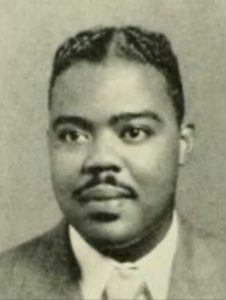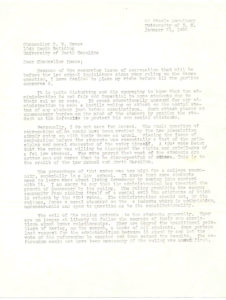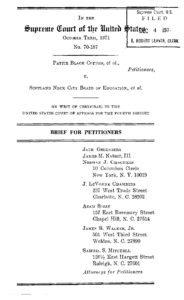
James Walker Jr, as pictured in the UNC Law School yearbook.
he Dialectic and Philanthropic Societies are UNC’s debating and literary society, and as the oldest student organization on campus, our history is the university’s history. Many of the university’s most notable alumni were senators in DiPhi including President James K. Polk, Vice President William R. King, Governor John Morehead, Pulitzer Prize winner Thomas Wolfe, and prominent NC lawyer, pastor, and civil rights leader, the Rev. James R. Walker, Jr. (Phi ’52).
Our historical presence on campus includes two beautiful chambers in two of UNC’s oldest buildings. In these chambers we host weekly parliamentary style debates and many other intellectual and social activities. One of the most noticeable features in both these chambers are the impressive number of portraits on the walls commemorating important alumni and historical figures associated with the societies. For the past two centuries, these portraits have served as a way to honor historical figures that have contributed to UNC and the people of North Carolina.
Unfortunately, even though DiPhi has existed since 1795 and collected over a hundred portraits since then, our group is not as culturally relevant or affluent as it once was. We have acquired very few portraits since Rev. Walker attended UNC in the 1950s, and at present, our collection does not represent the contributions of African American students and alumni to UNC and the people of this state. We have always regretted this historical disparity, and we would like to honor individuals whose contributions should never be forgotten. Rev. Walker, as a member of the Dialectic and Philanthropic Societies and a crucial leader of the Civil Rights Movement in North Carolina, is absolutely worthy of that distinction. We wish to commission a portrait of Rev. Walker to honor his memory and influence as the first African American senator of DiPhi.
This campaign is student-run, with the full support of the DiPhi Foundation. Donations made to this campaign will be reserved only for the purchase of a portrait of Mr. Walker by an artist of the senators’ choosing. (Note: PayPal does take a percentage of all online donations. Checks can be sent to PO Box 795, 179 E. Franklin St. Chapel Hill, NC 27514). You can learn more about DiPhi, a 501(c)(3) nonprofit organization, here: https://diphi.web.unc.edu.
James Walker's Bio
James Walker, Jr. was born on February 25th, 1924 in Ahoskie, North Carolina to Ethel and James Walker. He was the oldest of eight children, and spent most of his childhood in Statesville, NC. Walker attended North Carolina Central University from 1942 to 1943. In 1944 he enlisted in the army, and proudly served on both fronts of World War II. He was honorably discharged from the army in 1947, after which he re-enrolled at North Carolina Central, graduating in 1948. After graduating, he applied to the University of North Carolina Law School, where he was rejected on the basis of race.
Walker chose to attend North Carolina College at Durham Law School, however, he eventually withdrew due to unequal treatment. After withdrawing from the North Carolina College at Durham he transferred to Boston Law School. While attending Boston Law School, Walker was one of five plaintiffs in a case brought against UNC Law School for racial discrimination. They won their case, and in 1952 Walker became one of the first five African-American men to attend UNC Law School (and the first five to attend any UNC Chapel Hill school). While attending UNC, Walker was integral in the desegregation of campus, and the push for civil rights on campus. He led a student protest calling for the desegregation of UNC’s football stadium, and fought to integrate other aspects of campus life at UNC. He also became the first African-American member of the Dialectic and Philanthropic Societies.
In 1952, Walker graduated UNC, going on to become a prominent civil rights attorney in North Carolina. According to Walker’s family members, he rarely accepted money for his work. He chose instead to drive across the state, often using his car as an office. His many accomplishments include the spearheading of a massive voter registration campaign for African-American residents of Halifax County, and successfully arguing a voting rights case in front of the U.S. Supreme Court, as well as being an integral part of a second U.S. Supreme Court case dealing with school segregation. He was recognized by North Carolina’s NAACP, who gave him their Distinguished Service award. He was also honored by the National Lawyer’s Guild as Lawyer of the Year in 1978. Once retiring from law, Walker became a pastor, working at several different churches in North Carolina and Virginia. You can watch an in-depth video about Mr. Walker here.
https://player.vimeo.com/video/187025713?title=0&byline=0&portrait=0


